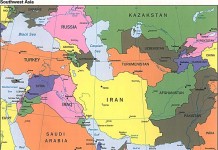Context
 According to statements from Pakistan’s top leadership, the country remains fully intent on proceeding with the IP gas pipeline project despite US apprehensions. On the other hand, President Ahmadinejad presented his commitment towards the project when he visited Pakistan to attend the D8 Summit in November 2012. Meanwhile, President Zardari’s trip to Iran scheduled for December 7th got postponed at the last minute. The purpose of his tour was to finalize the details and financing of the Iran-Pakistan (IP) gas pipeline project and to discuss the Afghan reconciliation.
According to statements from Pakistan’s top leadership, the country remains fully intent on proceeding with the IP gas pipeline project despite US apprehensions. On the other hand, President Ahmadinejad presented his commitment towards the project when he visited Pakistan to attend the D8 Summit in November 2012. Meanwhile, President Zardari’s trip to Iran scheduled for December 7th got postponed at the last minute. The purpose of his tour was to finalize the details and financing of the Iran-Pakistan (IP) gas pipeline project and to discuss the Afghan reconciliation.
Immediately following Ahmadinejad’s visit, a delegation of Iran’s parliamentary committee on national security and foreign policy, headed by Alaeddin Borojourdi, visited Pakistan on December 3rd. He held talks with the Chairman of Pakistan’s Senate Committee on Defense and Defense Production, Mushahid Hussain Syed. Mushahid had stated at the time that Iran and Pakistan have common views and concerns on the Afghan reconciliation,
“It is imperative that Pakistan and Iran work closely in the wake of the US pullout from Afghanistan by 2014”. According to media reports, during the meeting decision was made to increase cooperation and coordination between the defense ministries of the two countries.
Mushahid also offered support to Iran by stating that Pakistan rejects double standard on Iranian nuclear program, and that the issue should be resolved peacefully and without threats of force or intervention. Soon afterwards, Saudi Foreign Minister Prince Saud-Al Faisal invited Hina Rabbani Khar to visit the Kingdom. The above developments must have raised alarm bells in Riyadh especially now that Pakistan takes on the rotating presidency of the UN Security Council.
According to reports, Khar’s two-day visit to the Kingdom that started on January 1st was meant to strengthen the strategic relations between the two countries. During her visit, in addition to the Saudi Foreign Minister, Khar also met Crown Prince and Minister of Defense Salman bin Abdul Aziz.
Talking to Arab News after her meetings, Khar commented the talks “focused mainly on the roadmap and on a range of bilateral and regional issues including Syria and Afghanistan.” She went on to add, “I have intensive discussions on the roadmap that will set out a new vision of relationship between the two (Pakistan and Saudi Arabia) countries.”
Clearly, Khar’s visit was meant to smoothen Saudi anxieties towards improving Pakistan-Iran relations and bringing the Kingdom on board on the evolving Afghan reconciliation. Little was said about the substance of the new road map inferred to by Foreign Minister Khar. However, so far as Middle East remains in flux, managing Iranian, Turkish and Saudi anxieties regarding Pakistan’s new regional vision, will be an on-going and a delicate process.



